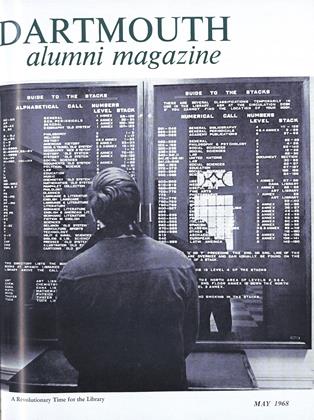By Bernard F. Engel. Glenview:Scott, Foresman and Company,1968. 84 pp. Paperback. $1.50.
"Richard Eberhart is a neo-romantic poet who demonstrates a willingness to assert generalizations and an interest in the exotic, melodic, and vers d'occasion. But, being a modern poet, Eberhart stresses with Marianne Moore, Wallace Stevens, and William Carlos Williams belief in the importance of the experiences and objects of life in the phenomenal world and, perhaps consequently, the need for precision in expression."
This is editor B. F. Engel's beginning, not mine, and we warily skip to the poems. Meanwhile, behind us, Engel is insisting on the "earthly truths" of Eberhart's poetryeven though Eberhart's birds sing to praise beauty, not to warn other birds away. Engel is more persuasive behind us when he belabors the other half of his thesis: Eberhart as "bardic" and "romantic." To put the matter crassly, Engel is an old-fashioned critic - the tone of "The Groundhog," he tells us, "is moved appropriately to the realm of the emotionally meaningful by the inversion of 'Dead lay he' in the third line" - and an old-fashioned writer is Eberhart.
Like the other non-books in this series, this is a small and relatively expensive selection of poems, prefaced by an essay, the real purpose of which is the ritual expression of literary piety. It makes no attempt to date, to ascertain, to evaluate, or to annotate the texts, and indeed there's not much necessity. Engel might have told us that "Diana's Pool" is in Chaplin, Conn.; "The Explorer on Main Street" is about Vilhjalmur Stefansson; the "man in blue denim" of "Protagonists" may be Robert Lowell ... but so what? Eberhart is not Eliot; his only sin against clarity is in those exasperating lines about housing problems: "Of Alexander in his tent;/Of Montaigne in his tower,/Of Saint Teresa in her wild lament.".
That lapse aside, he is the straightforward fellow that Dartmouth's Poet-in-Residence ought to be. (He is also a director of the Butcher Polish Company, and Engel quotes him as saying that he felt in the business world a "dynamism" that brought him "close to the heart of America.") His admirers should congratulate him on this promotion to the rank of academic text, and they should celebrate by buying one of his other collections of poems.
Professor O'Hara is a member of the Department of English, University of Connecticut.
 View Full Issue
View Full Issue
More From This Issue
-
 Feature
FeatureThe Making of a Primary Winner
May 1968 By WINTHROP A. ROCKWELL '70 -
 Feature
FeatureDartmouth's Alumni Relations
May 1968 -
 Feature
FeatureThe Library Revolution
May 1968 By Clifford L. Jordan '45 -
 Article
ArticleOxford Revisited
May 1968 By JOHN G. GARRARD, -
 Article
ArticleThe Undergraduate Chair
May 1968 By JOHN BURNS '68 -
 Class Notes
Class Notes1941
May 1968 By EARL H. COTTON, ROBERT G. THOMAS
J. D. O'HARA '53
Books
-
 Books
BooksFACULTY PUBLICATIONS
July 1919 -
 Books
BooksFACULTY PUBLICATIONS
May 1921 -
 Books
BooksTHE HARDER THEY FALL,
October 1947 By Joel W. Egerer -
 Books
BooksGENERAL ALARM: A DRAMATIC ACCOUNT OF FIRES AND FIRE-FIGHTING IN AMERICA.
NOVEMBER 1967 By JOHN A. RAND '38 -
 Books
BooksCIVIC RIGHTEOUSNESS AND CIVIC PRIDE
January 1915 By Newton Marshall Hall -
 Books
BooksJOURNEY ALL ALONE.
NOVEMBER 1971 By ROBERT F. HAUGH




